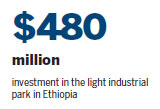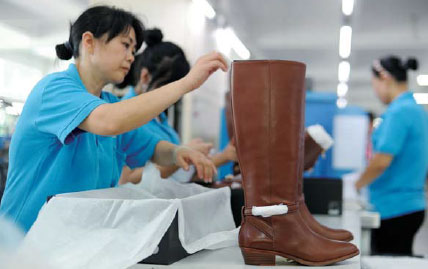Taking the next big step in successful cooperation
Having attracted the attention of dozens of enterprises in the Pearl River Delta city of Dongguan, Huajian Group, China's first shoe supplier to invest in Ethiopia, is pushing ahead to promote an international light industrial park in the African country.
The park, which began construction in 2015, involves capital input of 3.2 billion yuan ($480 million) and covers an area of 126 hectares. Scheduled for full completion by 2020, it is set to become the leading base in Ethiopia supplying footwear, leather products and garments.
The investment decision was made in the wake of the successful operation of the group's footwear project, which started production in 2012 and has put six modern lines in operation and offered jobs to more than 3,600 Ethiopians.
"Labor-intensive industries are losing their competitive advantages in Guangdong. Going abroad to Africa can be an option," said Zhang Huarong, chairman of Huajian.

Zhang based his analysis on the rising production cost in Guangdong, the province's strategy to upgrade its industrial structure, support from the government for the Belt and Road Initiative, as well as the rich resources, colossal market potential and much lower wage cost in Africa.
Industrialization, especially light industry manufacturing, is among the fields Guangdong is underscoring in its proposal for stronger ties with African countries, with others being agriculture and agribusiness, infrastructure development, trade and energy development, vocational training, tourism and culture.
Analysts said Guangdong's proposal is feasible, pragmatic, win-win and mutually beneficial.
On the one hand, Guangdong has benefited much from its wide international cooperation and foreign direct investment in its four-decade long opening-up, which has favorably positioned the province to take part in the Belt and Road Initiative, or specifically its African investments, they said.
Thanks to long-term international cooperation with developed countries as well as the province's strategy to optimize economic structure and promote innovation-driven development in recent years, the province has long occupied China's top position in economic development and has made outstanding achievements, infrastructure and energy development, education and training as well as tourism, said Guo Chu, an international economy researcher with the Guangdong Academy of Social Sciences.
In agriculture, the province has long led in fields such as fodder, aquaculture, horticulture, sugar, fruits, vegetables and poultry using its limited arable land, which stands at less than 0.03 hectare per capita, much below the nation's average, according to a study headed by the development research center of the provincial government.
In manufacturing, the province boasts many pillar industries such as electronic information, petroleum and chemicals, electrical machinery, electricity, food and beverages, transportation equipment, textiles and garments, general-purpose equipment, metal products and building materials.
New-type display, software, bio-medicine, new materials, new-generation communication and LED businesses have combined to form an industrial cluster worth more than 100 billion yuan.
Its light industrial products ranging from textiles and garments to foodstuff, medicines, furniture, leather, footwear and motorcycles are globally competitive.
In addition, Guangdong's household appliances makers have found their markets in more than 210 countries and regions worldwide, with their number of product categories and sales topping any other province in China.
In terms of vocational training, the province is the nation's first to subsidize vocational training programs and has set up a sound system for modern professional education and skills training - its 19 State-level bases for training skilled professionals are peerless nationwide.
In infrastructure development, the province has taken the lead to adopt market mechanisms by diversifying capital sources for its infrastructure development. Its modern traffic network has also taken shape.
In new energy, its wind, biomass, garbage, photovoltaic, solar and nuclear powers have all occupied prominent positions in China with several enterprises becoming industrial leaders, including Zhongshan Yangming Wind Power Group, Foshan Aikosolar, CSG Holding, Huawei, Devotion Corp, Guangdong Yuedian Group and China General Nuclear Power Corp.
In the tourism and cultural industries, well-off Guangdong residents have become China's largest tourist source and tourism is among the key industries the province is developing.
Its cultural industry has seen rapid development as the province has been striving to develop it into a pillar industry - the network ranges from publication and copyright services to print media, cultural exhibitions, printing and copying, news services, entertainment, electronic information to cultural products.
On the other hand, such sectors are in urgent demand and their market potential is immeasurable in African countries, the researcher said.
An op-ed article written jointly by senior executives of the World Bank, China Development Bank and UNIDO and a top Ethiopian official last year said that Africa needs a skilled labor force, infrastructure and a more conducive investment climate, which requires lower transport and energy costs and agribusiness among all.
Guo suggested that Guangdong investors engage more in the continent's strategic industries and shift more attention in time to value-added and technology-intensive product manufacturing, to minimize negative impacts on local fledgling businesses and trade friction.
|
A worker examines shoes at the production line of Huajian Group in Guangdong province. Zheng Zhibo / For China Daily |
(China Daily 08/31/2016 page12)















